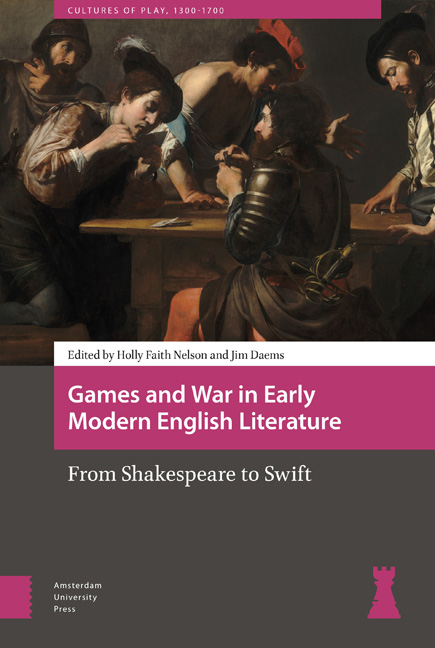Book contents
- Frontmatter
- Dedication
- Contents
- Acknowledgements
- The Interplay of Games and War in Early Modern English Literature: An Introduction
- 1 ‘Can this cock-pit hold the vasty fields of France?’ Cock-Fighting and the Representation of War in Shakespeare’s Henry V
- 2 Game Over: Play and War in Shakespeare’s Troilus and Cressida
- 3 Thomas Morton’s Maypole: Revels, War Games, and Transatlantic Conflict
- 4 Milton’s Epic Games: War and Recreation in Paradise Lost
- 5 Ciphers and Gaming for Pleasure and War
- 6 Virtual Reality, Role Play, and World-Building in Margaret Cavendish’s Literary War Games
- 7 Dice, Jesting, and the ‘Pleasing Delusion’ of Warlike Love in Aphra Behn’s The Luckey Chance
- 8 War and Games in Swift’s Battle of the Books and Gulliver’s Travels
- 9 Time-Servers, Turncoats, and the Hostile Reprint: Considering the Conflict of a Paper War
- Index
2 - Game Over: Play and War in Shakespeare’s Troilus and Cressida
Published online by Cambridge University Press: 21 November 2020
- Frontmatter
- Dedication
- Contents
- Acknowledgements
- The Interplay of Games and War in Early Modern English Literature: An Introduction
- 1 ‘Can this cock-pit hold the vasty fields of France?’ Cock-Fighting and the Representation of War in Shakespeare’s Henry V
- 2 Game Over: Play and War in Shakespeare’s Troilus and Cressida
- 3 Thomas Morton’s Maypole: Revels, War Games, and Transatlantic Conflict
- 4 Milton’s Epic Games: War and Recreation in Paradise Lost
- 5 Ciphers and Gaming for Pleasure and War
- 6 Virtual Reality, Role Play, and World-Building in Margaret Cavendish’s Literary War Games
- 7 Dice, Jesting, and the ‘Pleasing Delusion’ of Warlike Love in Aphra Behn’s The Luckey Chance
- 8 War and Games in Swift’s Battle of the Books and Gulliver’s Travels
- 9 Time-Servers, Turncoats, and the Hostile Reprint: Considering the Conflict of a Paper War
- Index
Summary
Abstract
Traditionally, William Shakespeare's fools have been seen as part of a longer theatrical tradition in which the fool's play is contrasted with the seriousness of the political world and the devastation of war. However, this chapter argues that because Troilus and Cressida portrays a world that is destined to be destroyed by total war (which audience members recognize), Thersites embraces war in all of its viciousness. Although Thersites mocks any legitimate notion of a casus belli, a sentiment shared by other characters in Troilus and Cressida, violence cannot be prevented or even alleviated by play.
Keywords: Shakespeare and the carnivalesque; Shakespeare and the Trojan War; Classical literature and Shakespeare; early modern masculinity and heroism
The past half century has been very kind to Shakespeare's clowns. They have become figures of subversion in the work of two east-European critics, Mikhail Bakhtin and Jan Kott, both of whom continue to enjoy extraordinary influence in the Anglophone world. Such an understanding of clowns draws on the belief that play must be understood in opposition to the seriousness of the official world and, in particular, to war. This belief can be traced to Plato's declaration in his Laws that ‘in war there is neither play nor culture worthy the name’. Johan Huizinga cites Plato on this point both at the beginning and end of Homo Ludens. More recently, Martin van Creveld cites Huizinga at the beginning of Wargames: From Gladiators to Gigabytes. In Shakespeare's Troilus and Cressida, however, the paradigmatic clown proves vicious, while games of love and chivalry prove helpless to halt the fictive world's descent into total war. Games take place, at best, in parentheses. The title characters’ erotic relationship, the gallantry of knights meeting for tournaments, the battles pursued so lackadaisically as to make truce indistinguishable from war are all swept aside by a movement to extreme violence and the inevitable destruction of Troy. Throughout Shakespeare's tragedy, the supposed opposition of play and war proves false.
Bakhtin's Rabelais and His World elevates clowns from the trivial role of providing so-called ‘comic relief’ to ‘the constant, accredited representatives of the carnival spirit in everyday life’. The carnival itself Bakhtin understands as ‘the people's second life, organized on the basis of laughter. It is a festive life’.
- Type
- Chapter
- Information
- Games and War in Early Modern English LiteratureFrom Shakespeare to Swift, pp. 39 - 54Publisher: Amsterdam University PressPrint publication year: 2019

